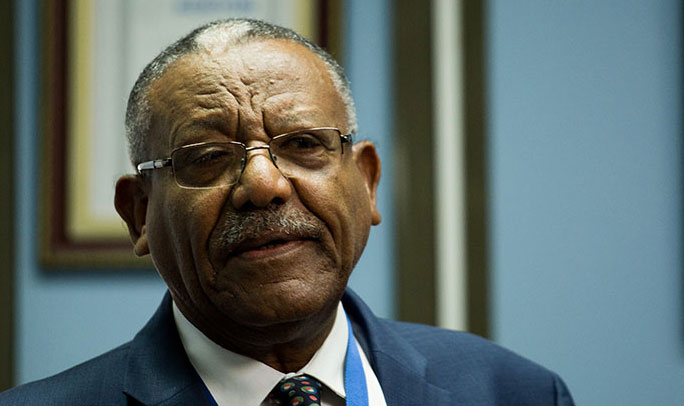
Commentaries | Jul 27,2024
Jun 27 , 2020
By Abebe Gashaw
The achievements of the current telecommunications service in addressing public needs are recognisable, but it needs salient improvement in almost all aspects. This invariably starts with the privatisation of the telecom monopoly and liberalisation of the sector, writes Abebe Gashaw (retta.abebe@gmail.com), a former senior manager at Ethio telecom and general manager at XMG Business Group.
The views expressed in the opinion piece headlined, “Ethio Telecom’s Privatisation Plan Requires Reset,” [Vol. 21, No. 1050, June 07, 2020], diverges from the effort by which the government believes progress can be gained within the telecom sector. This is despite the fact that the author concedes that liberalisation may be a good idea.
In proposing a “reset” of the privatisation plan, what the author lost sight of was the economic headway that could be attained by the country and the public with the liberalisation of the telecom sector in Ethiopia.
No doubt, it is open to speculation whether the privatisation of Ethio telecom and the licensing of at least two private service providers would achieve the desired targets to bring long-term financial and monetary returns from the sector. It is also hard to say whether the positive externalities gained through telecom efficiency at the personal, corporate and government levels will be as game-changing as they have been promised to be.
But it will be incumbent upon the organisations responsible for regulating the sectors, the Ethiopian Communications Authority and the Ministry of Innovation & Technology, to safeguard the process from abuse. There is surely a debate to be made here that the regulatory record of the government over the past decades has been more adversarial than friendly to businesses.
But this is a system that can be addressed, and the ambitious aim of the government here, it should be noted, is not merely financial proceeds from licensing and the partial privatisation of the telecom monopoly but the realisation of an impressive telecom operation, with improved key performance indicators, within the country.
Anyone that has been told at the banks or the customs office that the “system is down,” has already experienced firsthand the effects of an undeveloped telecom industry on other sectors. It has never been efficient for the public since it could never get the funding required to create the connectivity and backup systems that would have enabled an acceptable level of service.
This is while the operation of wireless mobile and internet services has been marred with outages and various network problems. All of these problems are attributable to the fact that telecom is a monopoly operation, unaccountable to its users because it does not have to worry about competition. Indebted, propped up by inadequate infrastructure and lacking competent workforce, Ethio telecom should not be the standard we look forward to in our country. The road to modernisation is paved with open competition and lighted by constant innovation and efficiency. Telecoms are no different in this regard.
A broad liberalisation of the telecom sector would enhance the availability of facilities including network infrastructure, hardware and services that will be built, staged and installed. This is private spending on infrastructure, which will enhance employment opportunities.
The process of instituting a new telecom company operation and engineering would also mean office leases, building construction, towers and facilities for power and ancillary services. The billing systems and facilities, server and hardware for the electronic exchanges of media and messaging all require new skills and allow enormous employment opportunities for Ethiopia’s graduates, including from technical colleges. The dispersion of new telecom services will also aid in the growth in business, finance, sales and marketing, as they attempt to adapt together.
New pieces of equipment imported by the licensee and related hardware will bring additional revenues to the government in terms of customs, transport and labour. This will be an added impetus to the economy, which will surely grow and become more productive as a result.
The achievements of the current telecommunications service in addressing the public's needs are recognisable but needs salient improvement in almost all aspects.
Interestingly, the piece mentions that “the major international telecommunications infrastructure for the transmission of data is fibre optic cables buried deep in the ocean around the world to which our country has no direct access.” The suggestion here is that Ethiopia, using income from its telecom monopoly, should commit to buying “shares and be part owner of neighbouring telecommunication companies in Djibouti, Kenya and Sudan, which are privately owned.”
Such massive investments though will be better utilised in the enhancement of telecom services to achieve higher performance indicators through infrastructure investments here at home. The fibre glut in international waters, on the other hand, is abundant, and the leasing of bandwidth is not a difficult option for the country to exercise at any time and on its own terms. Ethiopia’s access to international waters through neighbouring countries is also not a bad thing, especially considering that Djibouti and Eritrea are now close allies.
This goes to show the importance of taking stock of and complementing the government’s effort to privatise the ownership of the old telecommunications company and liberalise the industry. It guarantees the economic development of the country by ensuring efficiency in other sectors.
Carried out properly, as opposed to Nigeria and Tanzania in the 1990s where corruption and malfeasance were rife, liberalisation and privatisation of the industry will bring about economic advantages to the country.
Whether those who have discharged their responsibilities and social burdens in the past remain relevant in the current efforts of economic liberalisation, in the economy at large, remains to be seen. But this effort to modernise the telecom must be endorsed by the public if we are to do away with the old and bring in the future of telecom.
Abebe Gashaw is a former senior manager at Ethio telecom and general manager at XMG Business Group. He can be reached at retta.abebe@gmail.com.
PUBLISHED ON
Jun 27,2020 [ VOL
21 , NO
1052]


Commentaries | Jul 27,2024

Radar | Apr 15,2024

Fortune News | Aug 12,2023

Fortune News | Oct 09,2021

Photo Gallery | Oct 06,2021

Fortune News | Jul 13,2020

Fortune News | Jun 29,2019

Fortune News | Nov 20,2023

Viewpoints | Mar 25,2023

Radar | Mar 11,2024

My Opinion | 131819 Views | Aug 14,2021

My Opinion | 128203 Views | Aug 21,2021

My Opinion | 126147 Views | Sep 10,2021

My Opinion | 123767 Views | Aug 07,2021

Dec 22 , 2024 . By TIZITA SHEWAFERAW
Charged with transforming colossal state-owned enterprises into modern and competitiv...

Aug 18 , 2024 . By AKSAH ITALO
Although predictable Yonas Zerihun's job in the ride-hailing service is not immune to...

Jul 28 , 2024 . By TIZITA SHEWAFERAW
Unhabitual, perhaps too many, Samuel Gebreyohannes, 38, used to occasionally enjoy a couple of beers at breakfast. However, he recently swit...

Jul 13 , 2024 . By AKSAH ITALO
Investors who rely on tractors, trucks, and field vehicles for commuting, transporting commodities, and f...

Jul 5 , 2025
Six years ago, Ethiopia was the darling of international liberal commentators. A year...

Jun 28 , 2025
Meseret Damtie, the assertive auditor general, has never been shy about naming names...

Jun 21 , 2025
A well-worn adage says, “Budget is not destiny, but it is direction.” Examining t...

Jun 14 , 2025
Yet again, the Horn of Africa is bracing for trouble. A region already frayed by wars...

Jul 6 , 2025 . By BEZAWIT HULUAGER
The federal legislature gave Prime Minister Abiy Ahmed (PhD) what he wanted: a 1.9 tr...

Jul 6 , 2025 . By YITBAREK GETACHEW
In a city rising skyward at breakneck speed, a reckoning has arrived. Authorities in...

Jul 6 , 2025 . By NAHOM AYELE
A landmark directive from the Ministry of Finance signals a paradigm shift in the cou...

Jul 6 , 2025 . By NAHOM AYELE
Awash Bank has announced plans to establish a dedicated investment banking subsidiary...